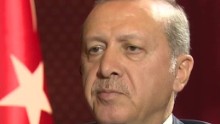The West should embrace Turkey's democratic resistance
It was late Friday evening when chaos erupted on Istanbul's Bosphorus Bridge, where military trucks were blocking traffic and soldiers in Istanbul and Ankara fired at civilians. In the midst of Turkey's struggle to preserve its democracy, the international media was occupied with shameless reporting and political nitpicking.
As unarmed civilians were bleeding in the streets, The New York Times tweeted, "A look at Erdogan's controversial rule," while Business Insider suggested "Erdogan could use the latest coup attempt to further tighten his grip." The Economist added, "If Mr Erdogan survives it, he will emerge stronger and more determined than ever to crack down on opponents."
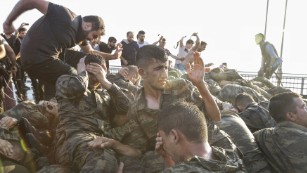
Soliders involved in the coup attempt surrender on Bosphorus Bridge on July 16 in Istanbul.
The leading experts in Washington were no different. Richard N. Haass, president of the Council on Foreign Relations who previously supported the coup in Egypt, tweeted: "Turkey coup presents dilemma to US, Europe govts: do you support non-democratic coup vs increasingly non-democratic authoritarian leader?"
As usual, the international media and American experts made the coup all about Turkish President Recep Tayyip Erdogan. They reduced a nation of almost 80 million people with a functioning democracy to a single politician's character.
Will Erdogan's countercoup succeed?
'Go to the streets'
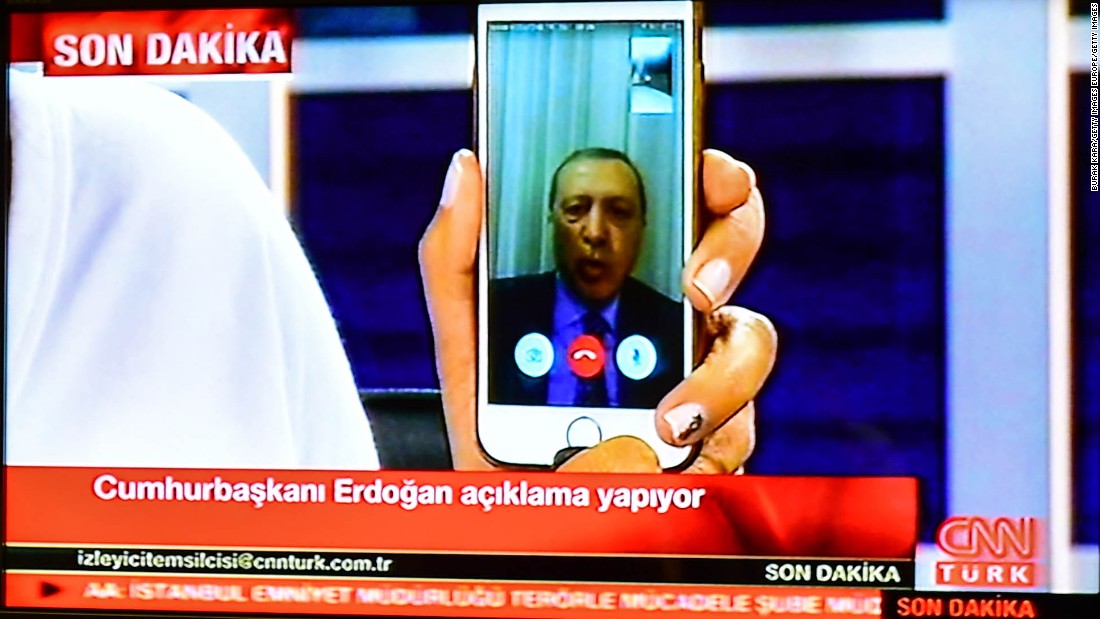
Turkish President Recep Tayyip Erdogan speaks on CnnTurk via FaceTime on July 15 in Istanbul.
At the height of the threat, Erdogan spoke to CNNTurk via FaceTime and called on his people to protect their democracy by going out to public squares and streets. "Go to the streets and give them their answer. I am coming to a square in Ankara," he said.
News organizations in the country, including fierce critics of the government, unequivocally opposed the coup, regardless of their experience with the President. Later on, one by one leaders of secularist, nationalist and pro-Kurdish opposition parties issued declarations or spoke on TV, reiterating their refusal to yield to a coup attempt. His well-known, defiant demeanor encouraged the media and opposition parties to align with him against a common threat.
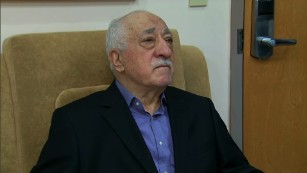
Turkey seeks extradition of Erdogan rival
Why do people of Turkey follow President Erdogan when he is seen as a deeply polarizing figure by many in the West? It's because he has been the only leader in Turkish history who could tame the military's influence in politics and survived another nonviolent coup attempt in 2007.
When the military opposed former Turkish President Abdullah Gül's nomination to the presidency because he had a wife with a headscarf, Erdogan did not refrain from issuing a strongly worded response and call for an early election. And he won.
Why shouldn't people support him? Everyone tends to forget that Erdogan's rule tripled the Turkish economy in size in the last 10 years. Turkish people now enjoy a veryaffordable universal health care system, education in public universities is free, and there has been a 30% increase in the minimum wage in 2016.
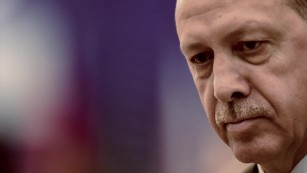
Who is Recep Tayyip Erdogan?
The government also invested in huge infrastructure projects such as high-speed railways, highways, airports and dams. His government conducted substantial reforms to accelerate European Union accession negotiations, including bringing the right of individual application to Turkish Constitutional Court, a new measure to prevent the closure of political parties and a new criminal law to prevent violence against women, along with new incentives for female employment.
His reforms focused on providing more rights and freedoms for Kurdish, Christian and Jewish minorities in the country.
The Turkish government permitted political campaigning in the Kurdish language, private channels are allowed to broadcast in Kurdish 24/7, Kurdish language bans in prisons were lifted, a ban on education in Kurdish language in private schools was removed and Kurdish selective courses were offered in public schools. The ruling AK Party returned more than $2 billion worth of confiscated minority properties to the original owners and the construction of new churches inside the country was allowed for the first time in the republic's history. Previously closed Armenian and Greek schools reopened and official ceremonies for holocaust victims were held for the first time in Ankara.
Weak opposition parties are in endless disputes due to failed leadership and they do not have a vision for the future of the country that appeals to the larger base of voters.
Amid the two civil wars next door and multiple terror attacks, Erdogan is seen as the only leader who can bring stability in this chaos. It is very possible that people will continue to support him until another leader with strong leadership abilities and a democratic track record emerges.
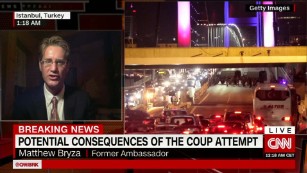
Forces loyal to Erdogan thwarted coup
Many in Turkey were not surprised when the government alleged it was the U.S.-based leader of the Hizmet movement, Fethullah Gulen, who orchestrated the coup. It is already documented that Gulen has had followers within the Turkish military and police force. The New York Times also reported that Gulen is known to have followers with a "strong presence in the police and judiciary, but less so in the military."
What does arresting 9,000 officers do to Turkey's military readiness?
Last week, public prosecutors indicted Col. Muharrem Kose for his involvement in a Gulenist conspiracy to eliminate rivals within military and state agencies in 2011. Victims were accused of passing intelligence to other agencies with fabricated evidence. Necip İscimen, deputy chief prosecutor for constitutional crimes, said on Friday night that this indictment expedited the coup because his team was about arresting the leaders.
It is important to understand that Gulen created enemies across the political aisles. His followers have targeted critical journalists and secularist generals with fabricated coup plots. In December 2013, they lost favor with the government by filing corruption charges against party officials just three months prior to local elections. The charges were later dropped. He has, in effect, alienated many political and social factions in Turkish society.
Pictures are surfacing in Turkey showing people detained in the wake of the failed coup.
The government's response to the coup was swift. At the height of the chaos when the outcome was unclear, top prosecutors in Istanbul and Ankara risked their lives to issue arrest warrants for junta leaders. Faced with the challenge of losing state authority completely, the government arrested or suspended thousands of military officers, judges, policeman and governors under suspicion of involvement in the attempted coup.
"Everyone should take seriously the President's call not to leave the streets due to risk of further attempts. There is more than 2839 FETO members in the TSK [Turkish Armed Forces]," tweeted Ahmet Zeki Ucok, a former military prosecutor. FETO (Fethullah Gulen Terrorist Organization) is the name given by the Turkish government to the network of Gulen supporters.
I believe the United States, the European Union and Turkey's Western allies must support the democratically elected government with more than just simple words. Western leaders should show solidarity with the people of Turkey by attending or at least sending their envoys to the protests in the streets of Turkey. Ankara's armed force, the second largest in NATO, faced countless risks against the Soviet threat during the Cold War. Turkey has been a partner against al Qaeda and the Taliban in Afghanistan, and recently against ISIS. It deserves solidarity.
Exclusive: Turkish President vows revenge
Turks have been through this before
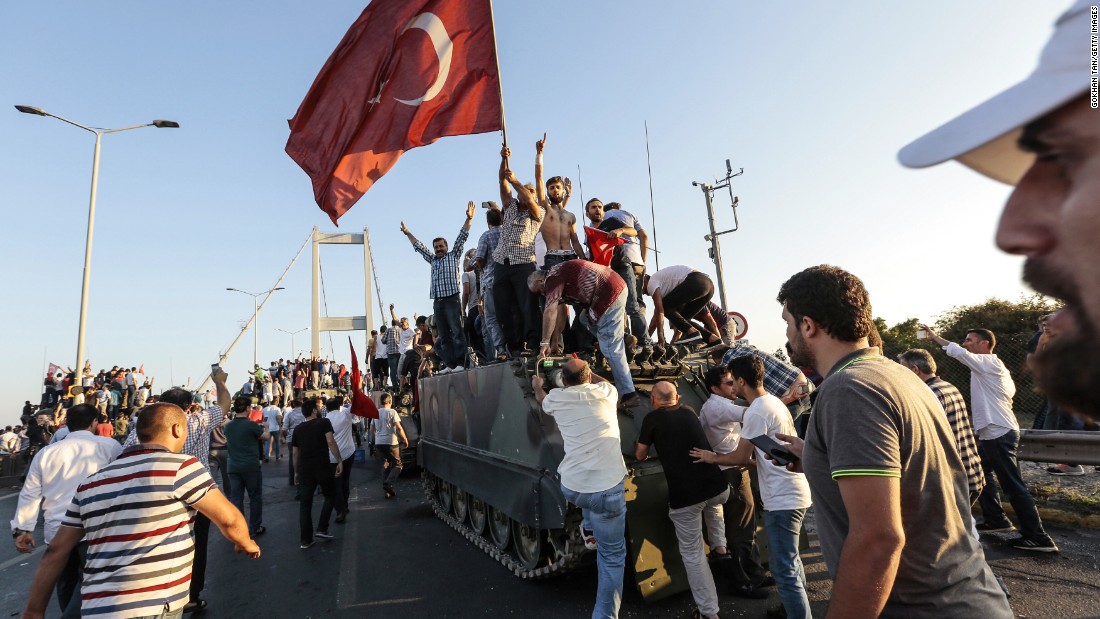
Supporters of Turkish President Recep Tayyip Erdogan wave flags as they capture a Turkish Army APC.
U.S. Secretary of State John Kerry, who supported the coup in Egypt by praising the generals for "restoring the democracy" in the country, should stop pretending that he is keeping to the moral high ground. Instead, the Obama administration should show its appreciation of Turkish democracy by helping it to survive, by not harboring Gulen and his largest chain of charter schools in America, which have faced FBI investigations.
While the international media and experts were concerned the coup was a hoax or an opportunity for a government power grab, the Turkish opposition and media opted to support a democratically elected government over a military regime. They believed that even a deeply flawed democracy was better than a regime where basic rights are suspended.
Turks have lived through three previous military coups. We know what it is. This is why people are still in the streets to celebrate their peaceful resistance against tanks and military jets. Undoubtedly this is a milestone in Turkish history, and its further success also depends on how the international community embraces it.
News Courtesy: www.cnn.com

